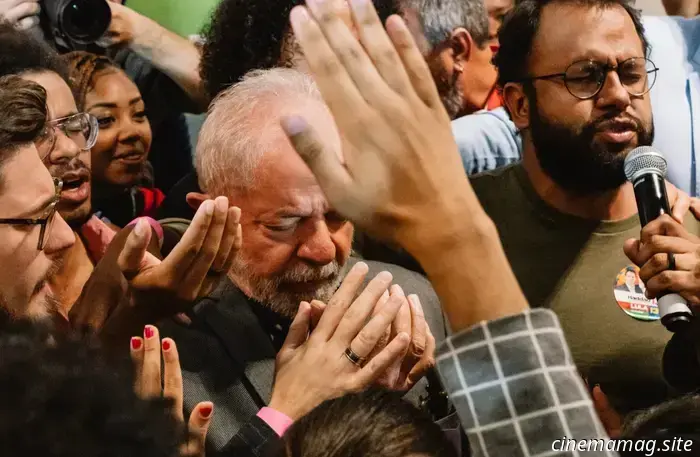
Apocalypse in the Tropics Review: An Examination of Brazil’s Politically Engaged Religious Right
Note: This review was originally published as part of our 2024 NYFF coverage. Apocalypse in the Tropics is now available in theaters and on Netflix.
Five years, the most closely contested presidential election in Brazil's history, and one insurrection following her previous analysis of Brazil's volatile socio-political landscape, documentarian Petra Costa—renowned for her films Elena and The Edge of Democracy—focuses on Jair Bolsonaro, the radical evangelical right that helped him secure the presidency in 2018, and the theocracy they are striving to establish. With Costa’s nearly unrestricted access to key figures in contemporary Brazilian politics, the happenings in Apocalypse in the Tropics unfold almost in real time, creating a captivating and significant documentary horror.
Costa's third feature film vividly portrays Brazil as a microcosm of events occurring in a globally interconnected world. It encapsulates the rising political right characterized less by specific ideologies and more by a nebulous, fanatical religiosity, alongside the spiritual and existential entitlement that accompanies it. This landscape compels rational individuals and critical thinkers to defend democracy against an anti-theocratic (yet ultimately secular) left. It is one thing for individuals to practice their faith without causing harm; it is entirely different when that faith fuels aspirations for an oppressive political regime that reinstates the union of church and state—a concept not alien to church history.
Rio de Janeiro had housed Brazil's National Congress until it moved to the newly established federal capital of Brasília in 1960. Congressional structures were intentionally redesigned and centralized across the expansive terrain to promote liberation and democratization in Brazil, which has since oscillated between a military dictatorship, one of the world's most liberal governments, and Bolsonaro, who campaigned on an ultra-right agenda that included (among other things) the brutal "reclamation" of Indigenous lands and the aim to arm citizens.
Examining Bolsonaro, his supporters, the public, and current President Luiz Inacio “Lula” da Silva—a figure whose previous administration faced serious accusations that do not pale relative to the overt criminal behavior championed by Bolsonaro and his extremist allies—Costa's intimate approach to all involved makes Apocalypse compelling in itself. Promptly, a major question arises: what would Bolsonaro be without his evangelical backing, as a figurehead primarily rather than a thinker?
Prior to receiving a transformative evangelical endorsement, Bolsonaro was a low-level ultra-right politician known for seizing media opportunities to incite controversy. His chances in the 2018 election were significantly bolstered by the militant evangelical web-tyrant Silas Malafaia's support. Additionally, after surviving a stabbing at a public rally, Bolsonaro's experience was lauded by Malafaia and the religious right as miraculous, uniting military supporters and swaying undecided voters to back him.
In office, Bolsonaro's presidency was a disaster. As the nation grappled with COVID, rather than procuring vaccines and addressing the public health crisis, he and Malafaia held a press conference urging citizens to fast and pray. While they enjoyed a lavish lifestyle in their mansions, Brazil's COVID death toll became the second highest globally, exceeding 700,000 lives due to many succumbing to “lack of assistance” at deprived medical facilities.
Let’s take a moment to consider who Silas Malafaia is: arguably the primary figure of Costa’s focus. Envision a blend of Joel Osteen, Joseph McCarthy, Billy Graham, Donald Trump, and a witch-hunting Puritan minister combined into a grotesque caricature: that is Silas Malafaia. As referred to by Costa, he is the Kingmaker, embodying both ecclesiastical and political manipulation, his “beliefs” shifting erratically over time depending on where he can wield influence. His fluctuating endorsements reveal his true priorities: power, wealth, and dominion over others—not allegiance to God, despite his claims.
In revealing interviews, Malafaia makes it clear that in his vision, if it were up to him/Christ, Brazil would exist as a theocracy governed by dominionism, which advocates that the church should dominate all spheres of culture, economy, and government. Among all the access Costa was granted, her encounters with Malafaia stand out as the most enlightening. The confrontational pastor is so consumed by indignance that he fails to see he is fortifying a movement he presumably opposes. Costa and her team merely need to direct the camera toward Malafaia; his vanity does the rest.
There are numerous striking scenes featuring him, but one particularly revealing moment occurs in his car, where he displays his Pentecostal rage, ranting about following a Jesus who overturned tables and struck people—a detail unrecorded in scripture. His reason for Jesus's anger? The profanation of the church into a marketplace, a hallmark achievement of Malafaia himself (through televangelism, now digital). In a moment of self-pity aboard his private jet, he laments

Other articles
 Drowning Dry Review: A Disturbing and Darkly Humorous Lithuanian Drama
Note: This review was initially shared during our coverage of the 2024 Locarno festival. "Drowning Dry" will be released in theaters on July 18. Memories can be elusive. Consider the events that unfold around the midpoint of Laurynas Bareiša's captivating second feature: two women––specifically Ernesta (Gelminė Glemžaitė) and Juste (Agnė Kaktaitė), sisters vacationing with their individual
Drowning Dry Review: A Disturbing and Darkly Humorous Lithuanian Drama
Note: This review was initially shared during our coverage of the 2024 Locarno festival. "Drowning Dry" will be released in theaters on July 18. Memories can be elusive. Consider the events that unfold around the midpoint of Laurynas Bareiša's captivating second feature: two women––specifically Ernesta (Gelminė Glemžaitė) and Juste (Agnė Kaktaitė), sisters vacationing with their individual
 Netflix reveals a live-action series based on Solo Leveling.
Netflix is set to adapt Solo Leveling into a live-action series, confirming that production has begun on this highly popular Korean intellectual property. According to the official press release, actor Byeon Woo-seok (from 20th Century Girl) will star in the role of Sung Jin-woo, an E-rank Hunter, which is the lowest classification. [...]
Netflix reveals a live-action series based on Solo Leveling.
Netflix is set to adapt Solo Leveling into a live-action series, confirming that production has begun on this highly popular Korean intellectual property. According to the official press release, actor Byeon Woo-seok (from 20th Century Girl) will star in the role of Sung Jin-woo, an E-rank Hunter, which is the lowest classification. [...]
.jpg) Watch John Lennon pour his emotions into his performance during his first concert after the Beatles (Exclusive).
The new documentary One to One: John & Yoko explores a fascinating period in the lives of John Lennon and Yoko Ono: He has departed from the Beatles and is preparing a
Watch John Lennon pour his emotions into his performance during his first concert after the Beatles (Exclusive).
The new documentary One to One: John & Yoko explores a fascinating period in the lives of John Lennon and Yoko Ono: He has departed from the Beatles and is preparing a
 A Short History of Krypto, Superman's Canine Companion
Krypto, Superman's dog, has a rich history with the Man of Steel and plays a significant part in the new trailer for James Gunn's Superman.
Top Welcome Bonus Casino Offers for 2025 — Get Free Cash to Begin Playing - MovieMaker Magazine
As we reach the midpoint of 2025, it's an opportune moment to reassess your online casino choices. In this article, we will assist you in updating your
A Short History of Krypto, Superman's Canine Companion
Krypto, Superman's dog, has a rich history with the Man of Steel and plays a significant part in the new trailer for James Gunn's Superman.
Top Welcome Bonus Casino Offers for 2025 — Get Free Cash to Begin Playing - MovieMaker Magazine
As we reach the midpoint of 2025, it's an opportune moment to reassess your online casino choices. In this article, we will assist you in updating your
 Daredevil: Born Again season 2 has completed filming and has added another returning actor from the original Netflix series.
The highly awaited second season of Daredevil: Born Again has completed production. However, that's not the only thrilling update, as fans of the original Netflix Daredevil series will be pleased to know that another actor is making a comeback to support Daredevil and his companions in their battle against Kingpin. Naqam Washington shared this news in an Instagram post.
Daredevil: Born Again season 2 has completed filming and has added another returning actor from the original Netflix series.
The highly awaited second season of Daredevil: Born Again has completed production. However, that's not the only thrilling update, as fans of the original Netflix Daredevil series will be pleased to know that another actor is making a comeback to support Daredevil and his companions in their battle against Kingpin. Naqam Washington shared this news in an Instagram post.
Apocalypse in the Tropics Review: An Examination of Brazil’s Politically Engaged Religious Right
Note: This review was initially published as part of our coverage of the 2024 NYFF. "Apocalypse in the Tropics" is now playing in theaters and available on Netflix. After five years, during Brazil's most closely contested presidential election and following one insurrection since her last analysis of the country's turbulent socio-political landscape, Petra Costa––the talented filmmaker known for "Elena" and "The Edge of"
